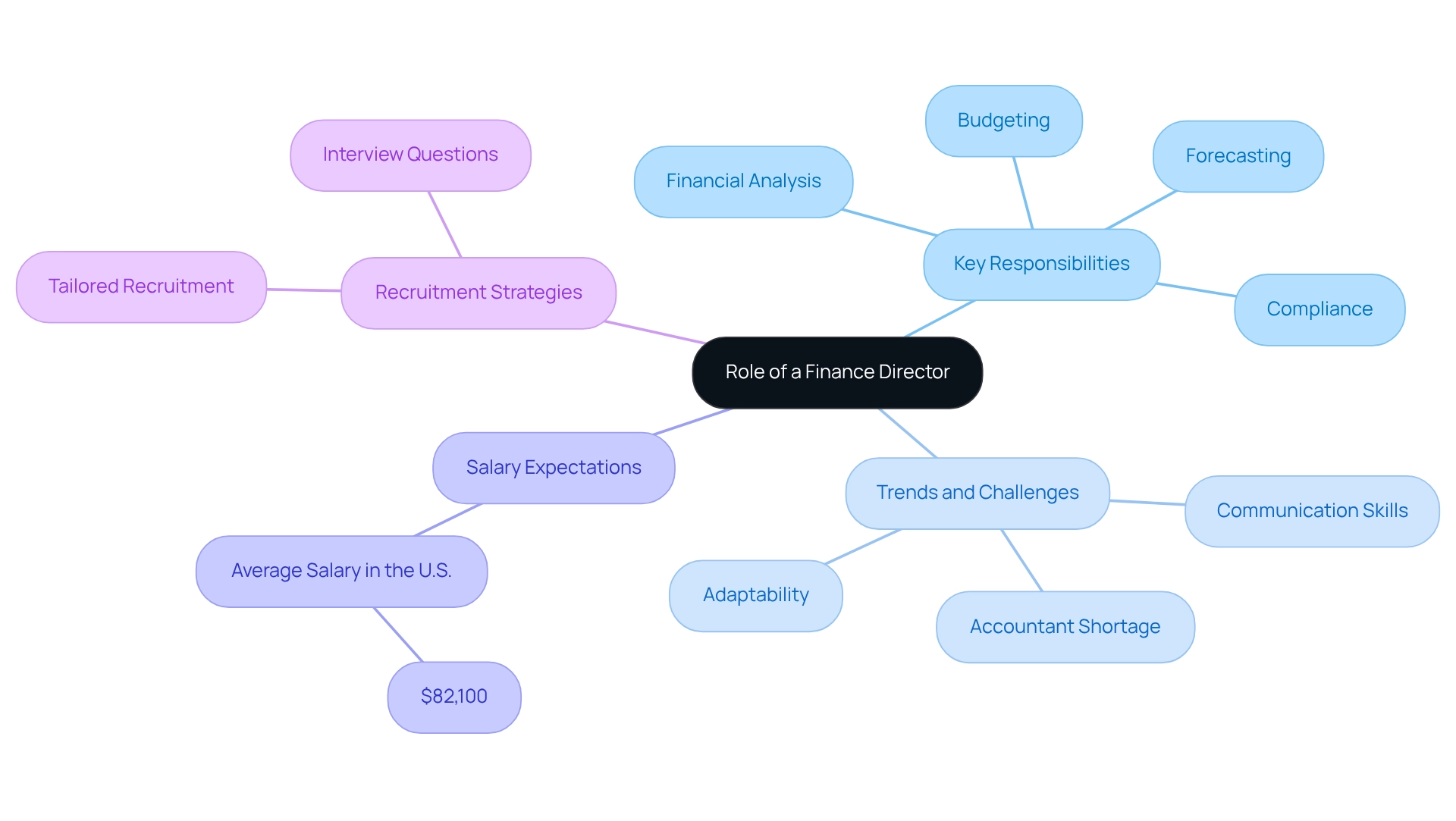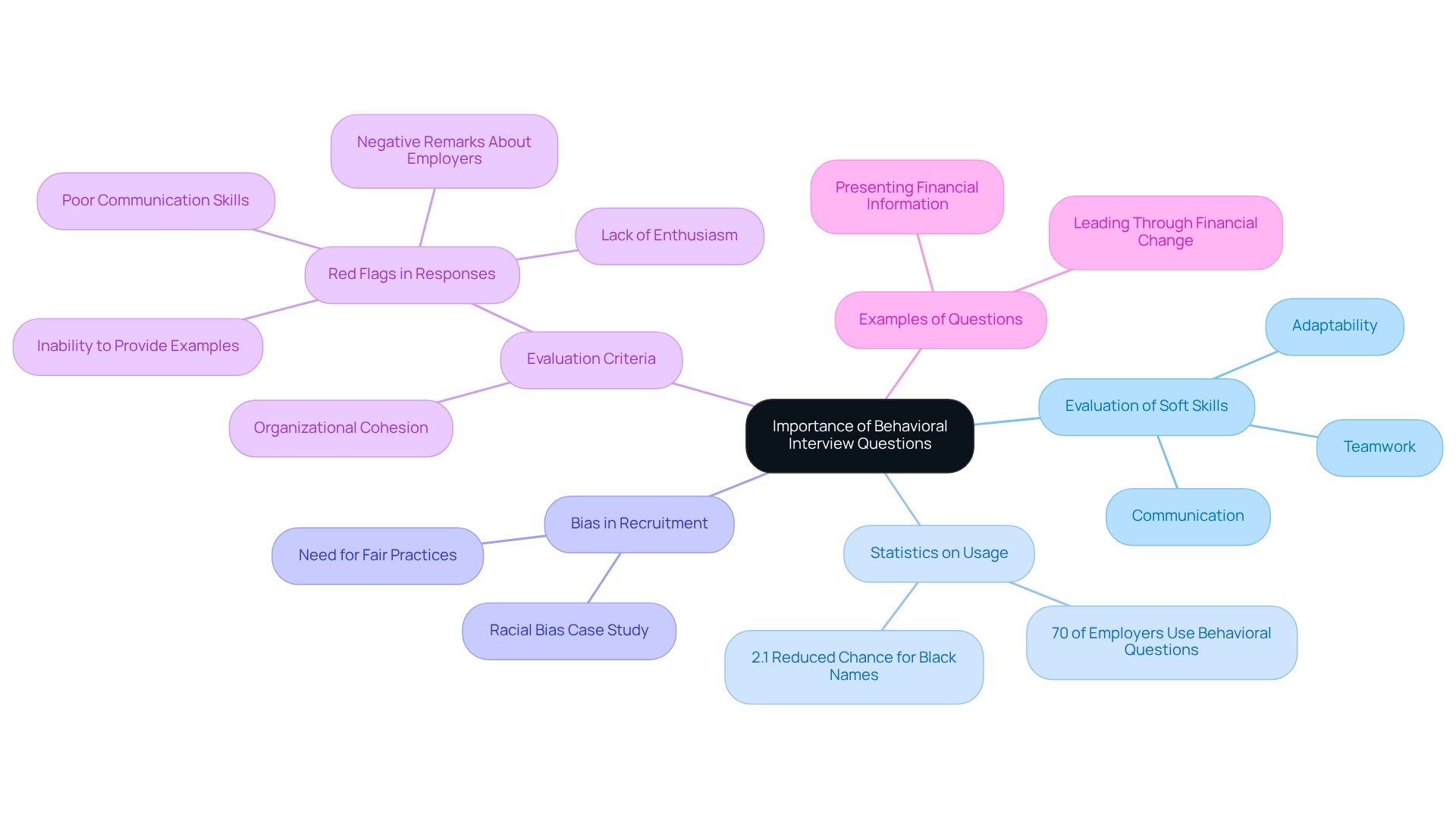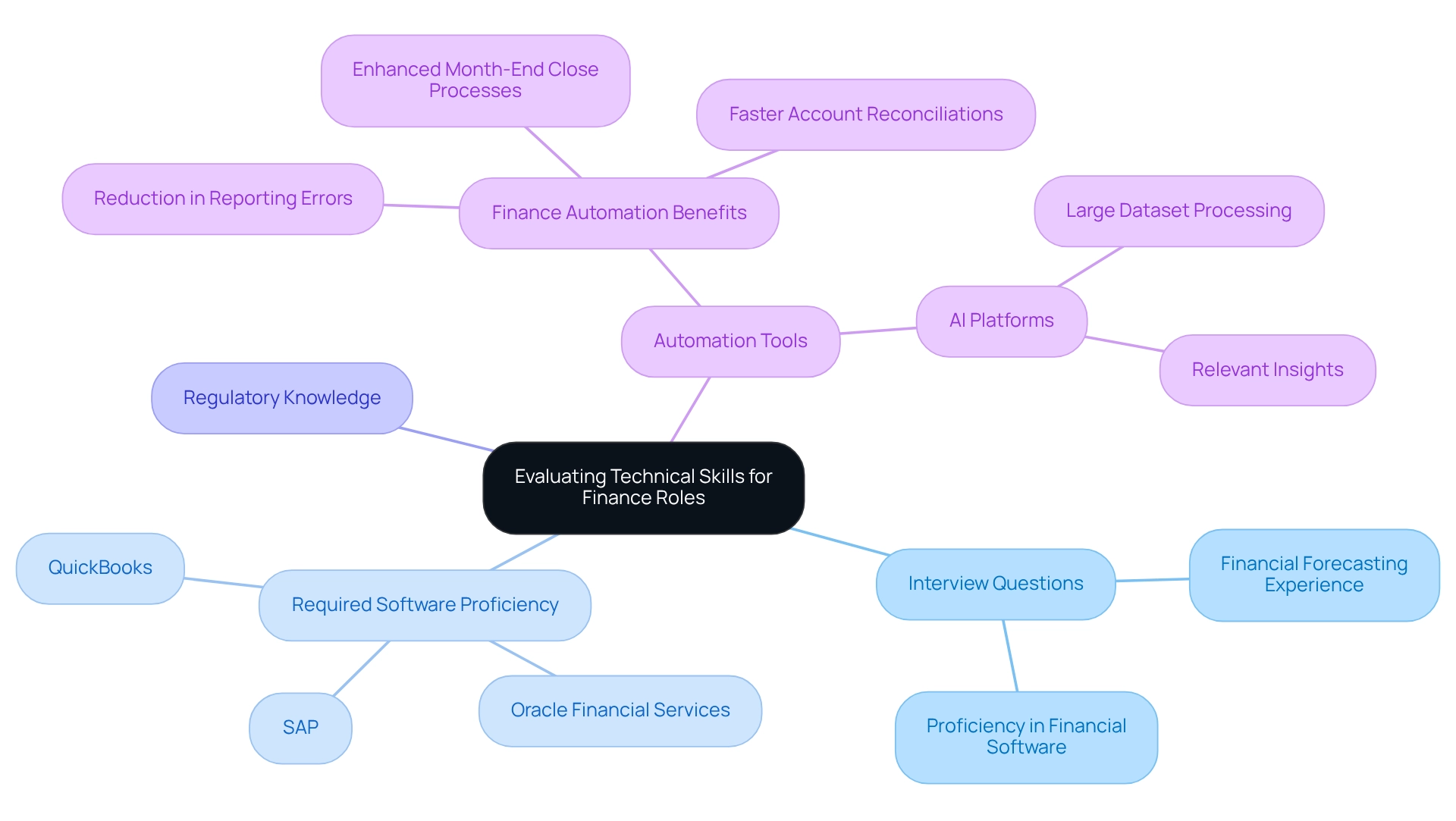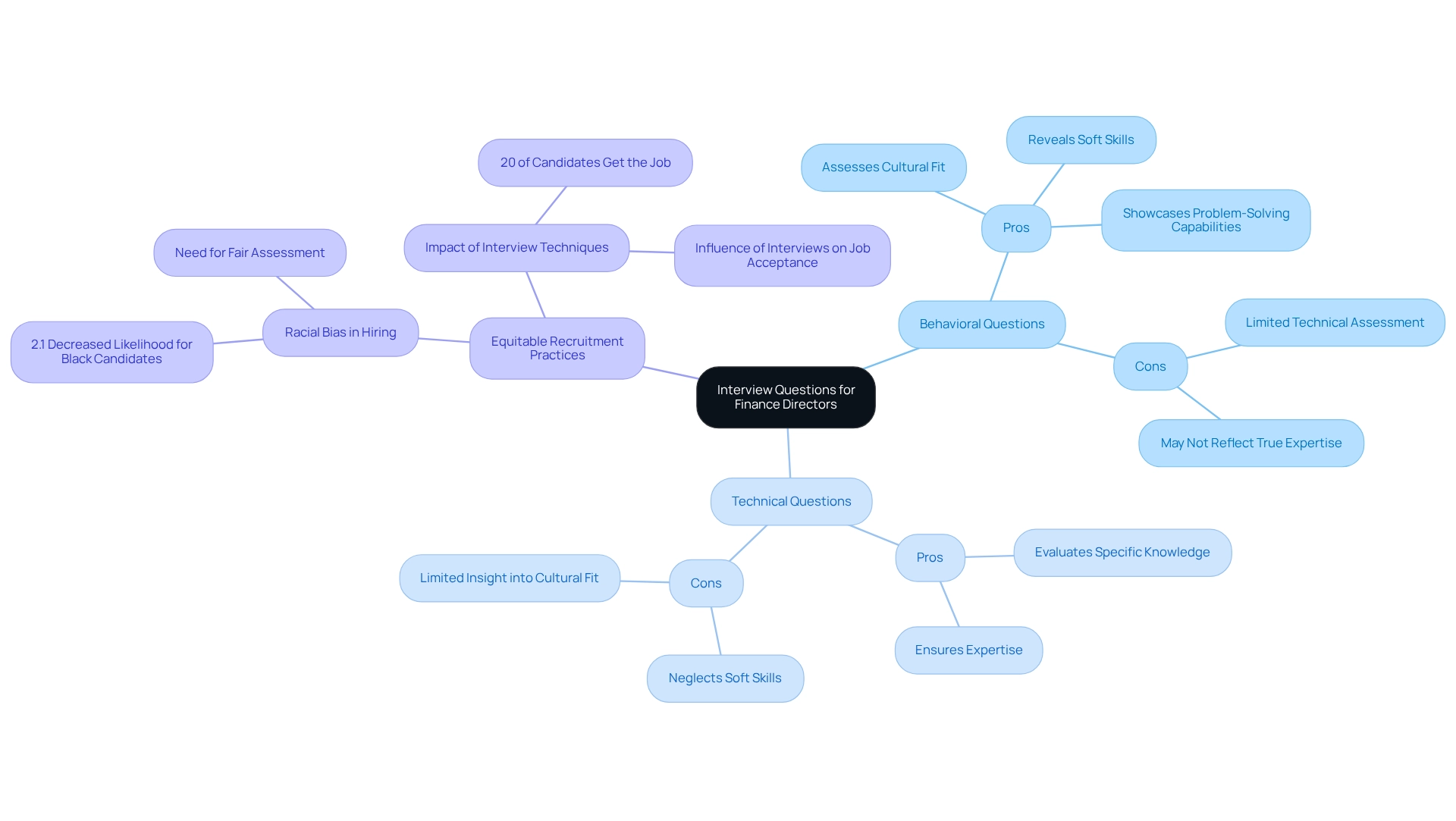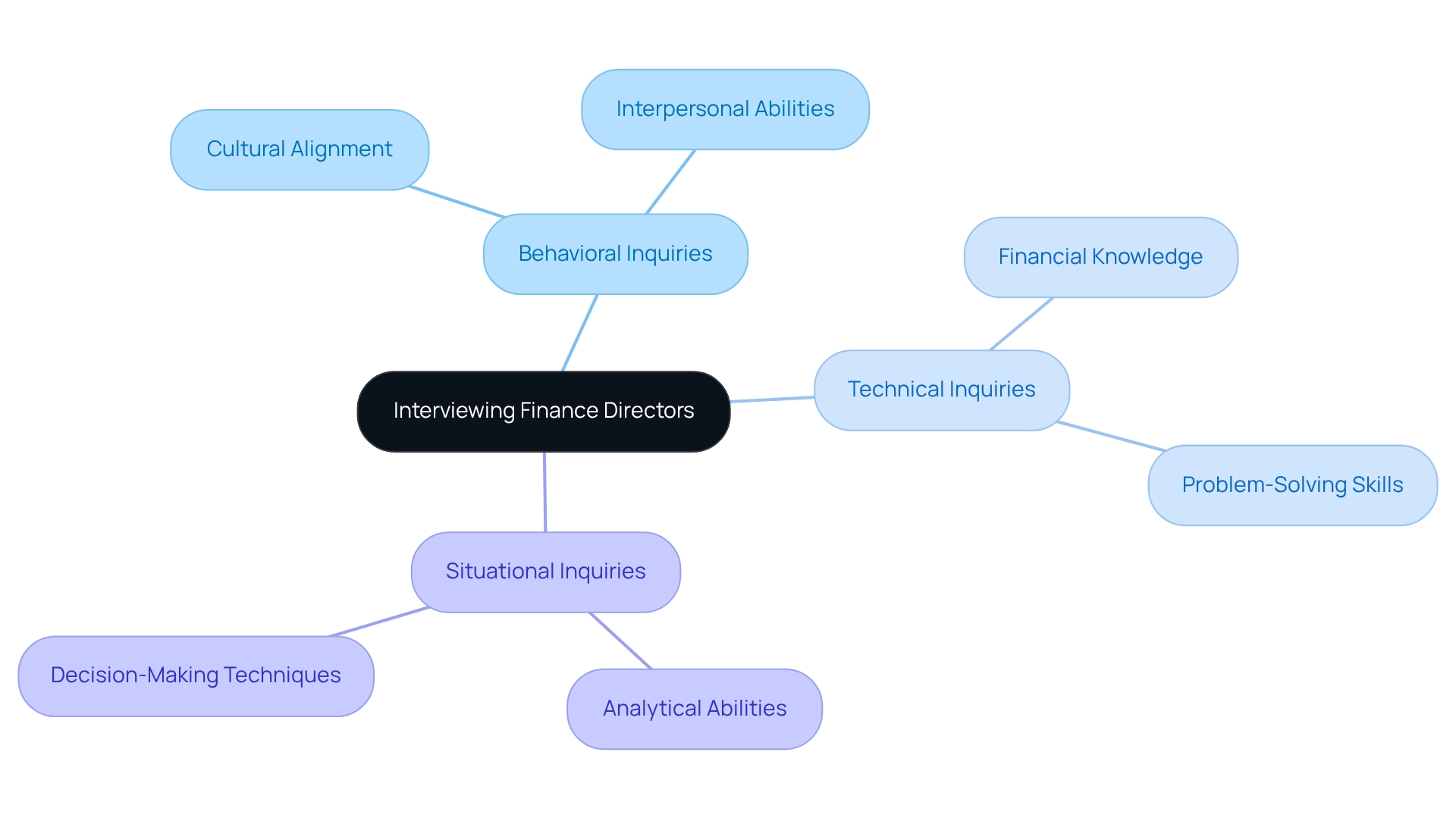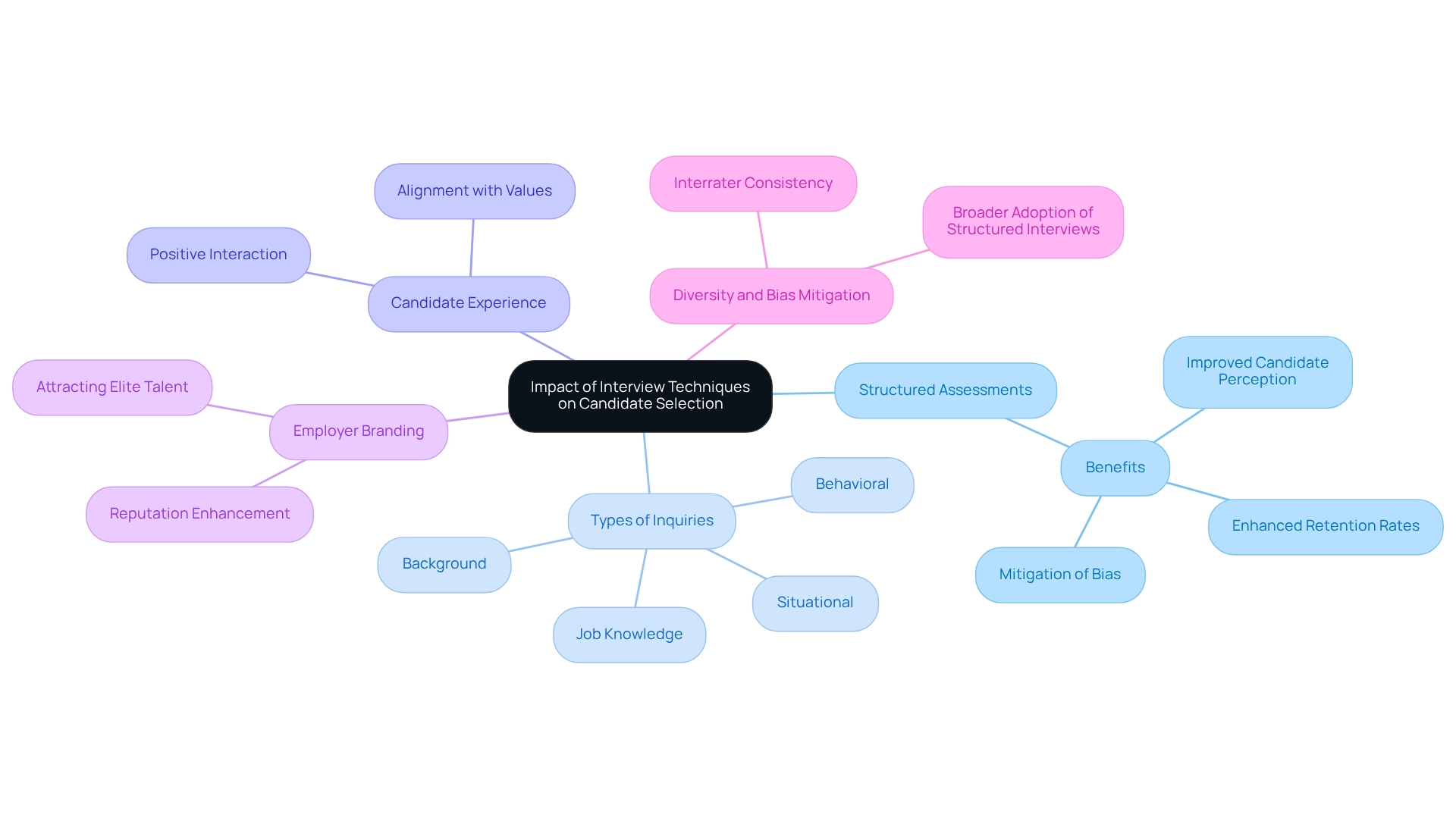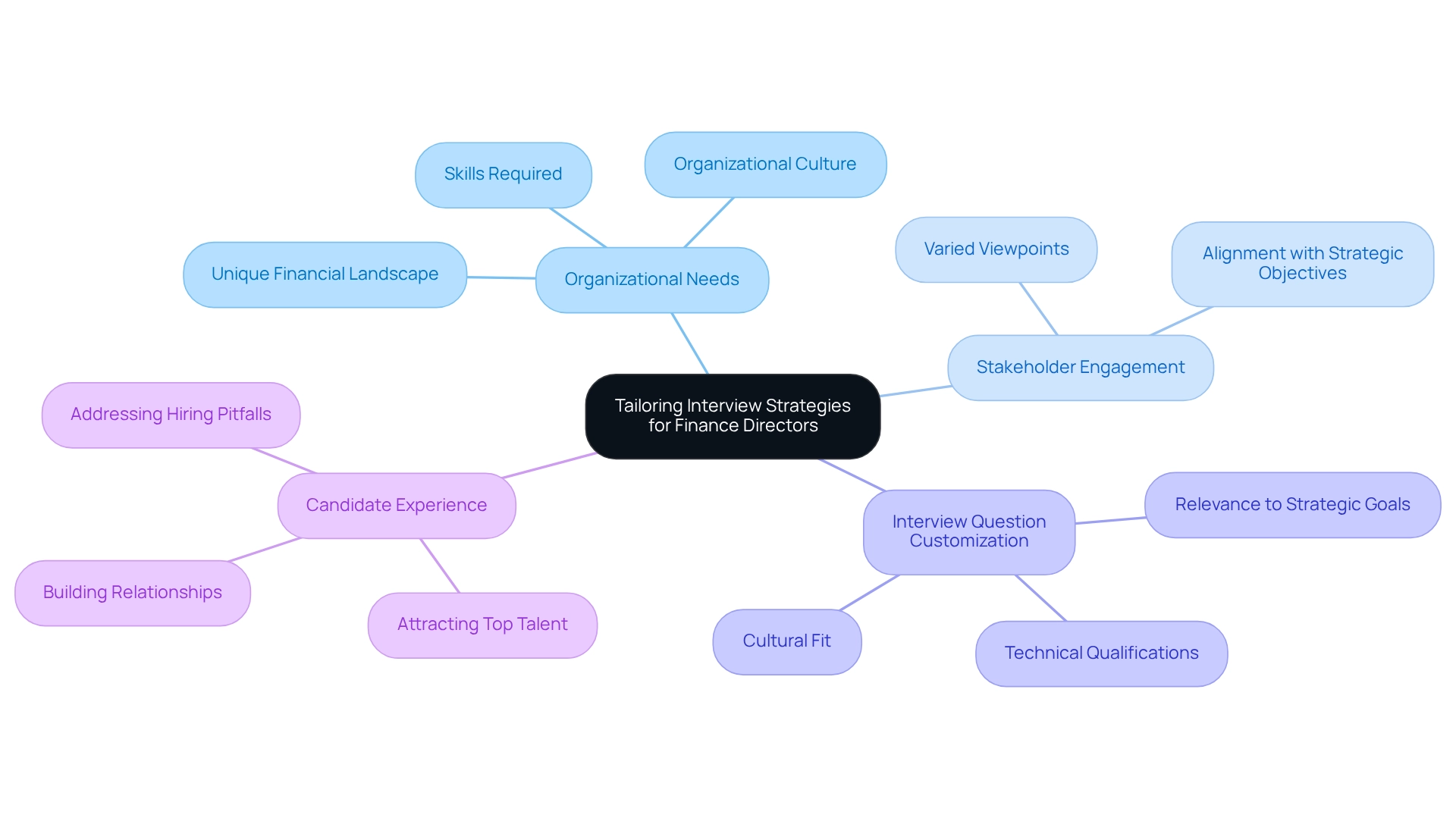Overview
The article addresses a critical issue in the recruitment of finance directors by comparing behavioral and technical approaches in interviews. It concludes that employing a dual strategy is the most effective method for evaluating candidates. This conclusion is supported by the assertion that behavioral questions are essential for assessing soft skills, while technical questions verify that candidates possess the requisite financial expertise. The integration of both question types ultimately leads to superior hiring outcomes. This comprehensive approach not only enhances candidate evaluation but also positions firms as leaders in the competitive recruitment landscape.
Key Highlights:
- Finance Directors oversee financial planning, management, and reporting, crucial for organizational success.
- Key responsibilities include budgeting, forecasting, financial analysis, and ensuring regulatory compliance.
- In 2025, adaptability and strategic foresight are increasingly valued in Finance Directors.
- 48.2% of Finance Directors speak Spanish, highlighting the importance of communication skills.
- The average salary for Finance Directors in the U.S. is projected at $82,100, reflecting high demand.
- Behavioral interview questions are essential for assessing soft skills like communication and adaptability.
- Around 70% of employers now include behavioral questions in finance hiring processes.
- Racial bias persists in recruitment, with studies showing candidates with Black names face disadvantages.
- Technical skills in financial reporting, budgeting, and software proficiency are critical for Finance Directors.
- A dual approach using both behavioral and technical questions enhances candidate evaluation.
- Structured assessments improve the candidate experience and employer branding, leading to better hiring outcomes.
- Tailoring interview strategies to organizational needs and engaging stakeholders is vital for successful recruitment.
Introduction
In the dynamic world of finance, the role of a Finance Director has become increasingly pivotal, serving as the backbone of an organization’s financial strategy and health. As businesses navigate through complex financial landscapes, these leaders are tasked with not only managing budgets and forecasting but also driving sustainable growth through strategic insights.
With the demand for skilled professionals on the rise, understanding the nuances of the Finance Director role—alongside effective interview strategies—has never been more crucial.
This comprehensive exploration delves into the essential skills, interview techniques, and evolving responsibilities that define the future of finance leadership, ensuring organizations can attract and retain top talent in an ever-competitive market.
Understanding the Role of a Finance Director
The Finance Director is integral to an organization’s success, tasked with overseeing financial planning, management, and reporting. This role demands a unique combination of strategic vision and operational acumen, as Finance Directors are essential in safeguarding the organization’s financial health. Their key responsibilities encompass:
- Budgeting
- Forecasting
- Financial analysis
- Ensuring compliance with regulatory standards
Furthermore, they greatly affect decision-making activities by offering insights that mold the organization’s financial strategy.
In 2025, the environment for Finance Directors is changing, with an increasing focus on adaptability and strategic foresight. Recent trends indicate that organizations are increasingly seeking leaders who can navigate complex financial environments and drive sustainable growth. Notably, 48.2% of Finance Directors speak Spanish, highlighting the importance of communication skills in this role.
The average salary for Finance Directors in the U.S. is projected to be around $82,100, reflecting the high demand for skilled professionals in this field.
As firms like Boutique Recruiting focus on tailored recruitment solutions for high-demand finance roles, understanding the evolving responsibilities of Finance Directors becomes essential. Tailored recruitment procedures are crucial for attracting leading individuals who can align financial goals with organizational strategy. Expert opinions emphasize that Finance Directors must communicate effectively with other executives and stakeholders to foster collaboration and ensure that financial considerations are integrated into broader business decisions.
Additionally, the ongoing accountant shortage has led firms to adapt their hiring strategies, raising salaries and offering flexible work options to attract top talent. As Melissa Patino, CFO at N26, emphasizes, building relationships and ensuring visibility in one’s work are vital for career advancement in finance. As the role continues to grow, it is crucial for successful recruitment to develop effective finance director interview questions that assess both technical skills and behavioral competencies.
The Importance of Behavioral Interview Questions
Behavioral interview prompts are strategically designed to elicit responses that reveal how applicants have managed specific scenarios in their previous positions. This method is particularly vital for evaluating soft skills such as communication, teamwork, and adaptability—qualities that are indispensable for a Finance Director when responding to finance director interview questions that address the complexities of organizational dynamics. For example, when individuals are prompted to recount a time they successfully navigated a financial crisis, it not only illuminates their decision-making skills and resilience but also uncovers their method of problem-solving under pressure.
In the present competitive environment, where there is a battle for talent, the significance of behavioral questions in finance recruitment is emphasized by recent statistics showing that around 70% of employers now include these types of questions in their hiring methods for finance roles. This trend reflects a growing recognition of the need to assess candidates beyond technical expertise, focusing instead on their interpersonal skills and cultural fit within the organization. Candidates are not just evaluating the job; they are also assessing the organization’s hiring process.
A disorganized or disrespectful hiring experience can lead to losing top talent.
Furthermore, the persistent problem of racial bias in recruitment is emphasized by a case study named ‘Racial Bias in Interview Opportunities,’ which discovered that individuals with Black names have a 2.1% reduced likelihood of securing a meeting compared to those with white names. This highlights the importance of fair hiring practices, especially when evaluating individuals through behavioral assessments.
Important aspects to evaluate during discussions include warning signs in applicants’ replies, such as lack of enthusiasm, inability to provide specific examples, negative remarks about former employers, and poor communication abilities. These indicators can significantly influence the evaluation of an applicant’s suitability for a Finance Director role. Moreover, excessive rescheduling or disorganization during the selection process can indicate to candidates that the company lacks cohesion and respect for their time.
Examples of behavioral interview questions tailored for Finance Directors include:
- “Can you describe a time when you had to present complex financial information to a non-financial audience? How did you ensure they understood?”
- “Tell me about a situation where you had to lead a team through a significant financial change. What challenges did you face, and how did you overcome them?”
The benefits of utilizing behavioral interview questions extend beyond merely assessing technical qualifications. They offer a thorough perspective on an applicant’s soft skills, which are essential for effective leadership in finance. By focusing on past behaviors, employers can better predict how candidates will perform in similar situations in the future, ultimately leading to more informed hiring decisions.
As noted by Islam Salahuddin, a data consultant at The KPI Institute, “Standard deviation is the square root of the variance, bringing the units back to the same as the original data. It provides a more interpretable measure of spread.” This approach not only improves the recruitment method but also aids in developing a cohesive and high-performing finance team.
To ensure you attract top-notch talent, let’s discuss your hiring needs and how Boutique Recruiting can help streamline the process!
Evaluating Technical Skills: Key Questions to Consider
Technical skills are indispensable for a Finance Director, CFO, or Financial Manager, as they must exhibit a comprehensive understanding of financial reporting, budgeting, and compliance. Key finance director interview questions should include:
- Can you explain your experience with financial forecasting?
- What financial software are you proficient in?
These inquiries not only assess the applicant’s technical expertise but also their ability to apply this knowledge in practical situations.
In 2025, familiarity with the most common financial software, such as SAP, Oracle Financial Services, and QuickBooks, is crucial, as these tools are integral to modern financial operations. Furthermore, applicants should be well-versed in regulatory requirements and financial modeling techniques, which are vital for navigating the complexities of the role effectively.
Recent case studies, such as the one titled “Benefits of Finance Automation,” highlight that organizations leveraging finance automation have achieved significant operational efficiencies, including a reduction in reporting errors by up to 98%. This underscores the importance of applicants being skilled with automation tools that enhance month-end close processes and facilitate quicker account reconciliations, ultimately improving compliance and data quality for decision-making.
Expert opinions indicate that by 2026, an impressive 80% of finance departments will adopt AI platforms capable of handling large datasets, emphasizing the necessity for applicants to be proficient with advanced technologies. As Petra Martinis observed, these platforms will provide more relevant and precise insights, making it essential for applicants to possess the necessary technical skills. Therefore, evaluating an applicant’s technical skills through targeted questions is not only advantageous but essential for ensuring they can meet the evolving demands of financial leadership.
Boutique Recruiting’s customized approach to grasping these changing needs further enhances the recruitment process, ensuring that employers find individuals who are not only technically proficient but also aligned with the strategic goals of their organizations. Furthermore, Boutique Recruiting provides tailored recruitment solutions that address the needs of finance leadership positions, ensuring an ideal fit between applicants and organizational requirements.
Behavioral vs. Technical Questions: Pros and Cons
In the realm of finance director interview questions—particularly for roles such as CFO, Financial Manager, and Director of Finance—the decision between behavioral and technical inquiries presents distinct advantages and disadvantages. Behavioral inquiries are invaluable for unveiling an applicant’s soft skills and cultural fit within an organization. They provide critical insights into how candidates navigate real-world challenges, showcasing their problem-solving capabilities and interpersonal dynamics.
However, these inquiries may fall short in adequately assessing an applicant’s technical expertise, which is paramount for leadership positions in finance.
On the other hand, technical inquiries are essential for evaluating specific knowledge and skills pertinent to the finance industry. They ensure that candidates possess the requisite expertise to execute their roles effectively. Yet, an overemphasis on technical questions can result in a limited assessment, potentially neglecting vital soft skills that contribute to overall effectiveness in a leadership capacity.
To achieve a thorough evaluation of candidates, it is advisable to employ finance director interview questions that incorporate both behavioral and technical dimensions. This dual approach not only enhances the likelihood of identifying well-qualified individuals but also aligns with recent research indicating that one in four job seekers believe discussions significantly influence their decision to accept job offers. Furthermore, statistics reveal that only 20% of candidates who undergo assessments ultimately secure the position, underscoring the importance of proficient interviewing techniques.
Moreover, it is crucial to confront the ongoing issue of racial bias within the recruitment process. Studies have shown that candidates with Black names face a 2.1% decreased likelihood of obtaining an interview compared to their white counterparts. This underscores the urgent need for equitable recruitment practices, ensuring that all candidates are assessed fairly, regardless of their background.
By skillfully integrating both behavioral and technical inquiry types, hiring managers at Boutique Recruiting can create effective finance director interview questions that more accurately evaluate a candidate’s fit for finance leadership roles, ultimately leading to more successful placements.
Combining Approaches: Best Practices for Interviewing Finance Directors
To create a thorough assessment procedure for Finance Directors, CFOs, Financial Managers, and other financial leadership positions, it is essential to effectively integrate finance director interview questions that encompass both behavioral and technical inquiries. Starting the discussion with behavioral inquiries not only facilitates an evaluation of cultural alignment but also assesses interpersonal abilities—both of which are crucial for leadership roles. Following this, technical inquiries should be made to gauge the individual’s specific financial knowledge and problem-solving skills.
Incorporating situational inquiries that present hypothetical scenarios relevant to the role can significantly enhance the evaluation process. This allows candidates to showcase their analytical abilities and decision-making techniques in real-world contexts. Such a multifaceted approach provides a well-rounded perspective on the applicant’s qualifications and fosters a more engaging and informative interview experience, ultimately leading to improved hiring decisions.
As emphasized in a case study on Boutique Recruiting, understanding company culture and specific job requirements is vital in the recruitment process. Their meticulous approach ensures they present candidates who not only meet technical qualifications but also fit seamlessly within the organizational environment, thus enhancing client satisfaction. Furthermore, data from recent studies indicates that companies employing a combination of behavioral and technical questions experience a notable improvement in selection outcomes.
For instance, research shows that organizations implementing this dual-question strategy see a 30% increase in successful hires. Jay, Principal and CEO of Boutique Recruiting, underscores that the evolving needs in the recruitment process for finance roles necessitate a strategic approach to finance director interview questions. Additionally, insights derived from a proprietary algorithm based on the Wallet Allocation Rule provide a unique perspective on selection and assessment within the financial sector, ensuring that firms attract top talent effectively.
Impact of Interview Techniques on Candidate Selection
The methods employed during discussions are pivotal in shaping applicant selection outcomes, especially in today’s fiercely competitive landscape where the war for talent is ever-present. Organized assessments, which integrate behavioral and technical inquiries, consistently outperform unstructured formats in identifying the most qualified candidates. Research shows that applicants who engage in a structured assessment tend to develop a more favorable perception of the organization, thereby bolstering the employer’s brand.
This positive experience is particularly crucial in the finance sector, where finance director interview questions are instrumental in attracting elite talent. Intelligent and resourceful candidates are not merely seeking any job; they are in pursuit of the right position with the right company.
Hiring managers must navigate the selection process with precision to avoid losing out on top-tier talent. Candidates are actively evaluating the organization during discussions, looking for alignment with their values and career goals. According to Nicolas Roulin, structured job interviews are typically designed around four enhanced types of inquiries:
- Behavioral
- Situational
- Background
- Job knowledge
Incorporating a diverse range of these question types not only enables interviewers to assess an applicant’s technical skills but also evaluates their behavioral competencies and cultural fit within the organization. This comprehensive approach yields more informed hiring decisions, which can significantly improve retention rates. Notably, limiting job descriptions to a maximum of five competencies can streamline the hiring process, ensuring clarity and focus in applicant evaluation.
Furthermore, case studies underscore the effectiveness of organized discussions in mitigating bias and promoting diversity in candidate selection. The critique titled ‘Best Practices for Reducing Bias in Interviews‘ emphasizes that structured evaluations enhance interrater consistency and diminish biases, underscoring the need for broader adoption in finance hiring, particularly regarding finance director interview questions. By embracing these best practices, finance firms can refine their recruitment strategies, including the crafting of finance director interview questions, ultimately fostering a more robust and diverse workforce.
As the hiring landscape continues to evolve, particularly in 2025, the emphasis on organized assessments will likely remain a vital component of effective talent acquisition and employer branding.
Tailoring Interview Strategies to Organizational Needs
To effectively customize selection strategies for hiring Finance Directors, organizations must begin by thoroughly assessing their specific needs and challenges, which includes preparing relevant finance director interview questions. This involves a deep understanding of the unique financial landscape, organizational culture, and the precise skills required for the role. Tailoring finance director interview questions to reflect these factors not only improves the relevance of the assessment but also aligns it with the strategic goals of the organization.
Engaging essential stakeholders in the finance director interview questions process is vital, as it provides varied viewpoints that can greatly affect the choice of the suitable individual. Research suggests that organizations with stakeholder participation in hiring practices experience better alignment with strategic objectives, which is crucial for the success of financial leadership positions. By adopting a tailored approach, organizations can substantially increase their chances of selecting the ideal candidate for the Finance Director position by focusing on relevant finance director interview questions, ensuring that the individual not only possesses the necessary technical qualifications but also fits seamlessly within the organizational environment.
As Aimee Lucas, Senior Principal Analyst at Qualtrics XM Institute, states, “Organizations must master these in order to build a sustainable foundation for success.” This emphasizes the significance of mastering competencies in the interview. Moreover, with the proportion of job vacancies rising markedly by 2015, organizations encounter a competitive employment landscape that requires efficient recruitment methods.
Boutique Recruiting exemplifies this tailored approach by focusing on building lasting relationships and understanding company culture and specific job requirements. Their meticulous strategy enables them to present individuals who not only meet technical qualifications but also fit well with the organizational environment, ultimately leading to greater success in financial leadership roles. For example, Alexa, our Technical Marketing Lead, represents the dynamic and inventive essence we look for in applicants, highlighting the significance of creativity and communication in recruitment.
By moving beyond traditional job boards and fostering genuine connections, Boutique Recruiting enhances the candidate experience and attracts top talent, addressing common hiring pitfalls effectively.
In today’s competitive job market, it is crucial for organizations to streamline their hiring processes. Let Boutique Recruiting assist you in attracting top-notch talent by reaching out to us today!
Conclusion
The role of a Finance Director is increasingly critical as organizations confront complex financial challenges and pursue sustainable growth. This exploration underscores the essential skills and evolving responsibilities that define this position, highlighting the necessity of both technical expertise and robust interpersonal skills. The integration of behavioral and technical interview questions enables a comprehensive evaluation of candidates, ensuring they are not only proficient in financial management but also capable of fostering collaboration and strategic alignment within the organization.
As the recruitment landscape evolves, organizations must adopt tailored strategies that reflect their unique needs and culture. Engaging stakeholders in the hiring process significantly enhances the likelihood of identifying candidates who align with the organization’s objectives and values. The emphasis on structured interviews is vital in mitigating bias and improving diversity, ultimately leading to a more robust workforce.
Attracting and retaining top talent in finance leadership necessitates a strategic approach to interviewing that balances technical skills with behavioral insights. By implementing best practices in recruitment, organizations can ensure they select candidates who are not only technically qualified but also equipped to drive financial success in an ever-changing landscape. As the demand for skilled Finance Directors continues to rise, those who embrace these strategies will distinguish themselves in the competitive market, paving the way for enhanced organizational performance and growth.
Are you ready to elevate your recruitment strategy? Reach out for a consultation today.
Frequently Asked Questions
What is the role of a Finance Director in an organization?
The Finance Director oversees financial planning, management, and reporting, playing a crucial role in safeguarding the organization’s financial health through budgeting, forecasting, financial analysis, and ensuring compliance with regulatory standards.
What skills are essential for a Finance Director?
A Finance Director needs a combination of strategic vision and operational acumen, along with strong communication skills to effectively collaborate with other executives and stakeholders.
How is the role of Finance Directors changing by 2025?
By 2025, the focus for Finance Directors is shifting towards adaptability and strategic foresight, with organizations seeking leaders who can navigate complex financial environments and drive sustainable growth.
What is the average salary for Finance Directors in the U.S.?
The average salary for Finance Directors in the U.S. is projected to be around $82,100.
How are firms adapting their hiring strategies for Finance Directors?
Firms are raising salaries and offering flexible work options to attract top talent due to an ongoing accountant shortage, and they are focusing on tailored recruitment procedures to align financial goals with organizational strategy.
Why are behavioral interview prompts important in hiring Finance Directors?
Behavioral interview prompts are crucial for evaluating soft skills such as communication, teamwork, and adaptability, which are essential for a Finance Director in managing organizational dynamics.
What percentage of employers include behavioral questions in their hiring methods for finance roles?
Around 70% of employers now include behavioral questions in their hiring methods for finance roles.
What are some warning signs to look for in applicants during interviews?
Warning signs include lack of enthusiasm, inability to provide specific examples, negative remarks about former employers, and poor communication abilities.
Can you provide examples of behavioral interview questions for Finance Directors?
Examples include: ‘Can you describe a time when you had to present complex financial information to a non-financial audience?’ and ‘Tell me about a situation where you had to lead a team through a significant financial change.’
What are the benefits of using behavioral interview questions in the hiring process?
Behavioral interview questions help assess an applicant’s soft skills and provide insights into how they may perform in similar situations in the future, leading to more informed hiring decisions.
